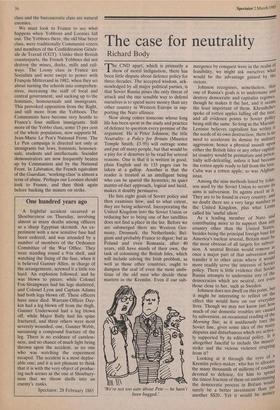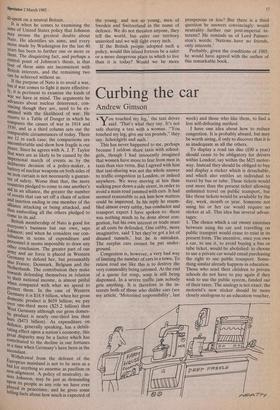The case for neutrality
Richard Body
The CND apart, which is primarily a show of moral indignation, there has been little dispute about defence policy for three decades. The accepted wisdom, ack- nowledged by all major political parties, is that Soviet Russia poses the only threat of attack and the one sensible way to defend ourselves is to spend more money than any other country in Western Europe in sup- porting the Nato alliance.
Now along comes someone whose long life has been spent in the study and practice of defence to question every premise of the argument. He is Peter Johnson; the title Neutrality: a Policy for Britain (Maurice Temple Smith, £3.95) will outrage some and put off many people, but that would be a pity for it deserves to be read for several reasons. One is that it is written in good, plain English and its 133 pages can be taken at a gallop. Another is that the reader is treated as an intelligent being who can be spared the hysterics; its quiet matter-of-fact approach, logical and lucid, makes it doubly persuasive.
He lists eight goals of Soviet policy and then examines how, and to what extent, they are being achieved. Incorporating the United Kingdom into the Soviet Union or reducing her to being one of her satellites does not find a place in the list. Before we are submerged there are Western Ger- many, Denmark, the Netherlands; Bel- gium and probably France to digest; but as Poland and even Romania, after 40 years, still have minds of their own, the task of colonising the British Isles, which will include solving the Irish problem, as well as those other countries, ought to dampen the zeal of even the most ambi- tious of the old men who decide these matters in the Kremlin. Even if our sub- 'We're not too sure about Pete — he hasn't been bugged.' mergence by conquest were in the realm of feasibility, we might ask ourselves what would be the advantage gained by the victors.
Johnson recognises, nonetheless, that one of Russia's goals is to undermine and destroy democratic and capitalist regimes, though he makes it the last, and it seems the least important of them. Khrushchev spoke of rotten apples falling off the tree; and all evidence points to Soviet policy being still the same. So long as the Marxist- Leninist believes capitalism has within it the seeds of its own destruction, there is no need to accelerate its demise by militarY aggression; hence a physical assault upon either the British Isles or any other capital- ist country would be premature and poten- tially self-defeating, unless it had become the rotten apple ready to fall from the tree. Cubawas a rotten apple; so was Afghan- istan.
Among the nine methods listed by John- son used by the Soviet Union to secure its aims is subversion. Its agents excel at it They are to be found in every country, and no doubt there are a very large number in the United Kingdom, plus what Lenin called his 'useful idiots'. As a leading member of Nato and contributing more to its support than anY country other than the United States, besides being the principal foreign base for America's nuclear arsenal, Britain must be the most obvious of all targets for subver- sion. A neutral Britain would remove at once a major part of that subversion and, transfer it to other areas where it wool' more readily serve the interests of Soviet policy. There is little evidence that Soviet Russia attempts to undermine any of the democracies which are neutral, not even those close to her, such as Sweden. Johnson does not dwell on this point, but it might be interesting to reflect on the effect this would have on our everydaY lives. Though we may not know just how. much of our domestic troubles are caused by subversion, an occasional reading of the Morning Star, as it assiduously toes the Soviet line, gives some idea of the manY disputes and disturbances which are active- ly supported by its editorial policy. Is d, altogether fanciful to include the miners strike and the vicious violence erupting from it? Looking at it through the eyes of a Kremlin policy-maker, who has to allocate the many thousands of millions of roubles. devoted to defence, for him to spend the tiniest fraction of them on undermhil the democratic process in Britain woul surely be a better investment than yet another SS20. Yet it would be money ill-spent on a neutral Britain.
It is when he comes to examining the alms of United States policy that Johnson may arouse the greatest doubts about Nato. He identifies six aims; and every move made by Washington for the last 40 Years has been to further one or more or them. The disquieting fact, and perhaps a central point of Johnson's thesis, is that four of these aims are inconsistent with British interests, and the remaining two can be achieved without us.
If the purpose of Nato is to avoid a war, but if war comes to fight it more effective- IY, it is pertinent to examine the kinds of war we have in mind. The arguments he advances about nuclear deterrence, con- vincing though they are, need to be ex- amined with the likelihood of war. He resorts to a Table of Danger in which he compares the causes of war in 1914 and 1939, and in a third column sets out the comparable circumstances of today. There are 12 in each case; the comparisons are uncomfortable and show how fragile is our Peace. Since he agrees with A. J. P. Taylor that wars are as likely to be caused by the Impersonal march of events as by the deliberate decision of a policy-maker, a battery of nuclear weapons on both sides of an iron curtain is not necessarily a guaran- tee of safety. Worse than that, the more co, untries pledged to come to one another's aid in an alliance, the greater the number of events that can set off a chain of action and inaction ending in one member of the alliance attacking or being attacked, and thus embroiling all the others pledged to come to its aid. British membership of Nato is good for everyone's business but our own, says Jo.hnson; and when he considers our con- tribution in terms of expenditure and Personnel it seems impossible to draw any Other conclusion. The greater part of our _army and air force is placed in Western ermany to defend her, but presumably also France, Denmark, Belgium and the Netherlands. The contribution they make towards defending themselves in relation to their national income, is almost pitiful When compared with what we spend to Protect them. In the case of Western Germany it is $18.9 billion, when her gross domestic product is $659 billion; we pay
over one-third more ($25.2 billion) than West Germany although our gross domes- tic product is nearly one-third less than hers ($473 billion). As expenditure on defence, generally speaking, has a debili- tating effect upon a nation's economy, this great disparity may be a factor which has
contributed to the decline in our fortunes at a time when Germany's have been in the ascendant.
. Withdrawal from the defence of the European mainland is not to be seen as a
id for anything so anaemic as pacifism or non-alignment. A policy of neutrality, in- sists Johnson, may be just as demanding Upon its people as any role we have ever Played in peacetime; and he gives some telling facts about how much is expected of
the young, and not so young, men of Sweden and Switzerland in the name of defence. We do not threaten anyone, they tell the world, but enter our territory uninvited and we will fight every inch.
If the British people adopted such a policy, would this island fortress be a safer or a more dangerous place in which to live than it is today? Would we be more
prosperous or less? But there is a third question he answers convincingly: would neutrality further our post-imperial in- terests? He reminds us of Lord Palmer- ston's words: 'Nations have no friends, only interests.'
Probably, given the conditions of 1985, he would have agreed with the author of this remarkable book.















































 Previous page
Previous page